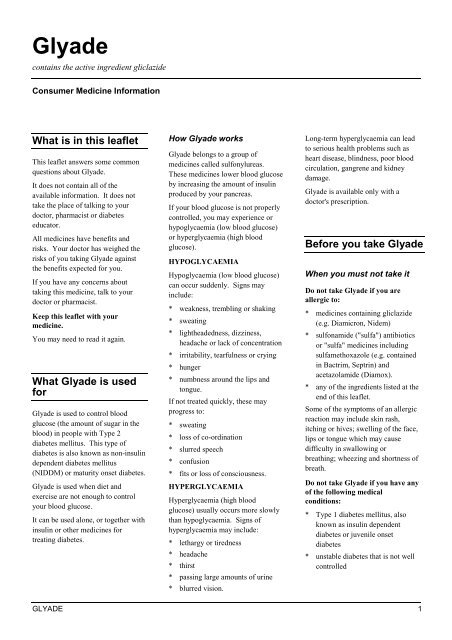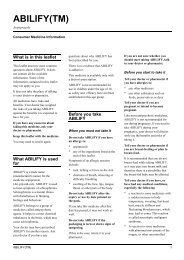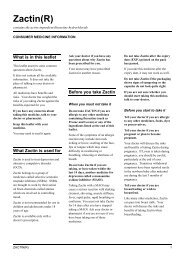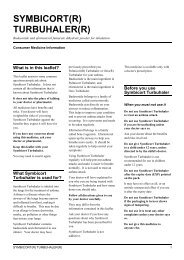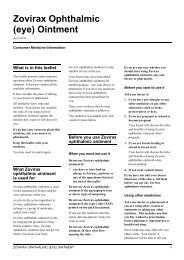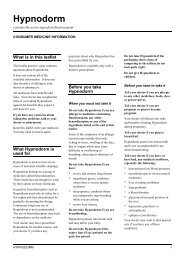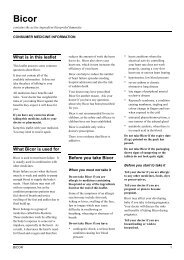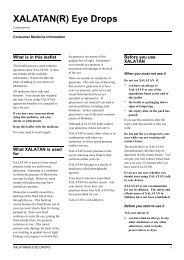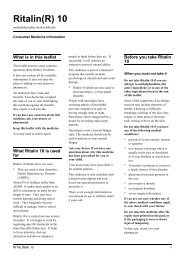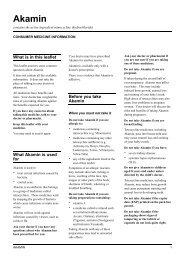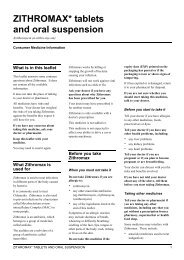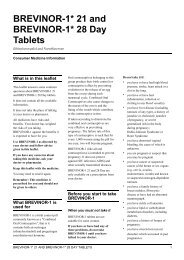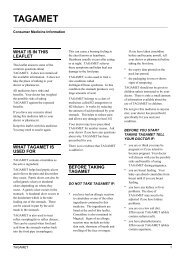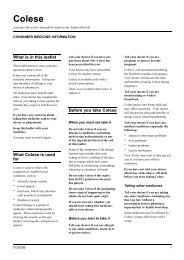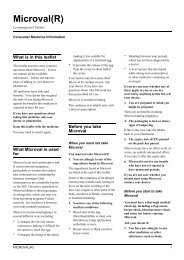Glyade - Alphapharm
Glyade - Alphapharm
Glyade - Alphapharm
- No tags were found...
You also want an ePaper? Increase the reach of your titles
YUMPU automatically turns print PDFs into web optimized ePapers that Google loves.
<strong>Glyade</strong>contains the active ingredient gliclazideConsumer Medicine InformationWhat is in this leafletThis leaflet answers some commonquestions about <strong>Glyade</strong>.It does not contain all of theavailable information. It does nottake the place of talking to yourdoctor, pharmacist or diabeteseducator.All medicines have benefits andrisks. Your doctor has weighed therisks of you taking <strong>Glyade</strong> againstthe benefits expected for you.If you have any concerns abouttaking this medicine, talk to yourdoctor or pharmacist.Keep this leaflet with yourmedicine.You may need to read it again.What <strong>Glyade</strong> is usedfor<strong>Glyade</strong> is used to control bloodglucose (the amount of sugar in theblood) in people with Type 2diabetes mellitus. This type ofdiabetes is also known as non-insulindependent diabetes mellitus(NIDDM) or maturity onset diabetes.<strong>Glyade</strong> is used when diet andexercise are not enough to controlyour blood glucose.It can be used alone, or together withinsulin or other medicines fortreating diabetes.How <strong>Glyade</strong> works<strong>Glyade</strong> belongs to a group ofmedicines called sulfonylureas.These medicines lower blood glucoseby increasing the amount of insulinproduced by your pancreas.If your blood glucose is not properlycontrolled, you may experience orhypoglycaemia (low blood glucose)or hyperglycaemia (high bloodglucose).HYPOGLYCAEMIAHypoglycaemia (low blood glucose)can occur suddenly. Signs mayinclude:* weakness, trembling or shaking* sweating* lightheadedness, dizziness,headache or lack of concentration* irritability, tearfulness or crying* hunger* numbness around the lips andtongue.If not treated quickly, these mayprogress to:* sweating* loss of co-ordination* slurred speech* confusion* fits or loss of consciousness.HYPERGLYCAEMIAHyperglycaemia (high bloodglucose) usually occurs more slowlythan hypoglycaemia. Signs ofhyperglycaemia may include:* lethargy or tiredness* headache* thirst* passing large amounts of urine* blurred vision.Long-term hyperglycaemia can leadto serious health problems such asheart disease, blindness, poor bloodcirculation, gangrene and kidneydamage.<strong>Glyade</strong> is available only with adoctor's prescription.Before you take <strong>Glyade</strong>When you must not take itDo not take <strong>Glyade</strong> if you areallergic to:* medicines containing gliclazide(e.g. Diamicron, Nidem)* sulfonamide ("sulfa") antibioticsor "sulfa" medicines includingsulfamethoxazole (e.g. containedin Bactrim, Septrin) andacetazolamide (Diamox).* any of the ingredients listed at theend of this leaflet.Some of the symptoms of an allergicreaction may include skin rash,itching or hives; swelling of the face,lips or tongue which may causedifficulty in swallowing orbreathing; wheezing and shortness ofbreath.Do not take <strong>Glyade</strong> if you have anyof the following medicalconditions:* Type 1 diabetes mellitus, alsoknown as insulin dependentdiabetes or juvenile onsetdiabetes* unstable diabetes that is not wellcontrolledGLYADE 1
* diabetic ketoacidosis, or a historyof repeated episodes ofketoacidosis (this a symptom ofuncontrolled diabetes, in whichsubstances called ketone bodiesbuild up in the blood - you maynotice this as an unusual fruityodour on your breath, difficultybreathing, confusion and frequenturination)* diabetic coma or pre-coma, whichmay follow on from diabeticketoacidosis mentioned above* severe kidney disease* severe liver disease.Do not take <strong>Glyade</strong> if you arepregnant or plan to becomepregnant.Insulin is more suitable forcontrolling blood glucose duringpregnancy. Your doctor will replace<strong>Glyade</strong> with insulin while you arepregnant.Do not take <strong>Glyade</strong> if you arebreastfeeding or plan tobreastfeed.<strong>Glyade</strong> is not recommended whileyou are breastfeeding.Do not give <strong>Glyade</strong> to children.There is not enough experience withthe use of <strong>Glyade</strong> in children.Do not take <strong>Glyade</strong> if the expirydate (EXP) printed on the pack haspassed.Do not take <strong>Glyade</strong> if thepackaging shows signs oftampering or the tablets do notlook quite right.If you are not sure whether youshould start taking <strong>Glyade</strong> askyour doctor.Before you start to take itTell your doctor if you are allergicto any other medicines, foods, dyesor preservatives.Tell your doctor if you have anymedical conditions, especially thefollowing:* kidney problems* liver problems* a history of diabetic coma* adrenal, pituitary or thyroidproblems* heart failure.Tell your doctor if you:* drink alcohol* do not eat regular meals* do a lot of exercise* are ill or feeling unwell.Alcohol, diet, exercise and yourgeneral health all strongly affect thecontrol of your diabetes. Discussthese with your doctor.If you have not told your doctorabout any of the above, tell thembefore you start taking <strong>Glyade</strong>.Taking other medicinesTell your doctor if you are takingany other medicines, including anythat you buy without aprescription from a pharmacy,supermarket or health food shop.Some medicines may be affected by<strong>Glyade</strong>, or may affect how well itworks. These include:* other medicines used to treatdiabetes, including insulin andmetformin (e.g. Diabex,Diaformin)* medicines that contain alcohol,such as cough and cold syrups* beta blockers, a group ofmedicines used to treat highblood pressure and other heartconditions, such as atenolol (e.g.Tenormin, Noten) and metoprolol(e.g. Betaloc, Minax)* monoamine oxidase inhibitors(MAOIs), a group of medicinesused to treat depression, such astranylcypromine (Parnate) andphenelzine (Nardil)* non-steroidal anti-inflammatorydrugs (NSAIDs), a group ofmedicines used to relieve pain,swelling and other symptoms ofinflammation, including arthritis,such as ibuprofen (e.g. Nurofen,Rafen)* medicines used to prevent bloodclots such as warfarin(Coumadin, Marevan)* cimetidine (e.g. Tagamet,Magicul), a medicine used to treatreflux and ulcers* clofibrate (Atromid-S), amedicine used to reduce highblood fat levels* corticosteroids such asprednisone (Panafcort, Sone) andcortisone (Cortate)* oestrogens in oral contraceptivesand hormone replacementtherapy* certain types of fluid tablets(thiazide diuretics), used to treathigh blood pressure and swelling,such as hydrochlorothiazide(Dithiazide) and chlorthalidone(Hygroton)* barbiturates, medicines used totreat epilepsy or for sedation,such as phenobarbitone.Your doctor or pharmacist can tellyou what to do if you are taking anyof these medicines. They also havemore information on medicines to becareful with or avoid while taking<strong>Glyade</strong>.If you are not sure whether you aretaking any of these medicines,check with your doctor orpharmacist.How to take <strong>Glyade</strong>Follow all directions given to youby your doctor and pharmacistcarefully.They may differ from theinformation contained in this leaflet.If you do not understand theinstructions on the pack, ask yourdoctor or pharmacist.How much to takeThe dose varies from person toperson.The usual starting dose is half atablet once a day. Your doctor mayincrease this dose up to four tablets aday, depending on how you respondto <strong>Glyade</strong>.GLYADE 2
How to take <strong>Glyade</strong>Swallow the tablets with a glass ofwater.The tablets can be divided in halfalong the breakline, if advised byyour doctor or pharmacist.When to take <strong>Glyade</strong>Do not skip meals while taking<strong>Glyade</strong>.It does not matter if you take <strong>Glyade</strong>before, during or after food.However, it is important that youtake it at the same time each day.If you need to take more than twotablets per day, take them as twodivided doses, in the morning andevening.How long to take <strong>Glyade</strong> forKeep taking <strong>Glyade</strong> for as long asyour doctor recommends.<strong>Glyade</strong> will help control diabetes butwill not cure it. Most people willneed to take <strong>Glyade</strong> for a long periodof time.If you forget to take <strong>Glyade</strong>If it is almost time for your nextdose, skip the dose you missed andtake your next dose when you aremeant to.Otherwise, take the missed dose assoon as you remember, and then goback to taking your tablets as youwould normally.Do not take a double dose to makeup for the dose you missed.If you are not sure what to do, askyour doctor or pharmacist.If you take too much <strong>Glyade</strong>(overdose)Immediately telephone yourdoctor, the Poisons InformationCentre (telephone 13 11 26), or goto Accident and Emergency at thenearest hospital, if you think youor anyone else may have taken toomuch <strong>Glyade</strong>. Do this even if thereare no signs of discomfort orpoisoning.If you take too much <strong>Glyade</strong>, youmay experience symptoms ofhypoglycaemia (low blood glucose).If not treated quickly, thesesymptoms may progress to loss ofco-ordination, slurred speech,confusion, fits or loss ofconsciousness.At the first signs of hypoglycaemia,raise your blood glucose quickly byeating jelly beans, sugar or honey,drinking a non-diet soft drink ortaking glucose tablets.While you are taking<strong>Glyade</strong>Things you must doBefore starting any new medicine,tell your doctor or pharmacist thatyou are taking <strong>Glyade</strong>.Tell all the doctors, dentists andpharmacists who are treating youthat you are taking <strong>Glyade</strong>.If you become pregnant whiletaking <strong>Glyade</strong>, tell your doctorimmediately.Make sure that you, your friends,family and work colleagues canrecognise the symptoms ofhypoglycaemia andhyperglycaemia and know how totreat them.HYPOGLYCAEMIAIf you experience any of thesymptoms of hypoglycaemia (lowblood glucose), you need to raiseyour blood glucose immediately.You can do this by doing one of thefollowing:* eating 5 to 7 jelly beans* eating 3 teaspoons of sugar orhoney* drinking half a can of non-dietsoft drink* taking 2 to 3 concentratedglucose tablets.Unless you are within 10 to 15minutes of your next meal orsnack, follow up with extracarbohydrates such as plainbiscuits, fruit or milk.Taking this extra carbohydrate willprevent a second drop in your bloodglucose level.HYPERGLYCAEMIAIf you experience any of the signsof hyperglycaemia (high bloodglucose), contact your doctorimmediately.The risk of hyperglycaemia isincreased in the following situations:* uncontrolled diabetes* illness, infection or stress* taking less <strong>Glyade</strong> thanprescribed* taking certain other medicines* too little exercise* eating more carbohydrates thannormal.Tell your doctor if you:* become ill* are injured* have a fever* have an infection* having surgery.Your blood glucose may becomedifficult to control at these times.Your doctor may replace <strong>Glyade</strong>with insulin.Visit your doctor regularly so thatthey can check on your progress.Your doctor may want to check youreyes, feet, circulation, kidneys, heart,and blood pressure.Check your blood glucose levelsregularly.This is the best way to tell if yourdiabetes is being controlled properly.Your doctor or diabetes educator willshow you how and when to do this.Carefully follow your doctor's anddietitian's advice on diet, drinkingalcohol and exercise.If you drink alcohol while taking<strong>Glyade</strong>, you may get flushing,headache, breathing difficulties,rapid heart beat, stomach pains orGLYADE 3
feel sick and vomit. Thecombination of alcohol and <strong>Glyade</strong>also increases the risk ofhypoglycaemia occurring.Tell your doctor immediately ifyou notice the return of anysymptoms of hyperglycaemia youhave experienced before starting<strong>Glyade</strong>.These may include lethargy ortiredness, headache, thirst, passinglarge amounts of urine and blurredvision. These may be signs that<strong>Glyade</strong> is no longer working, eventhough you may have been taking itsuccessfully for some time.sick days.When you are travelling, it is agood idea to:* wear some form of identification(e.g. bracelet) showing you havediabetes* carry some form of sugar to treathypoglycaemia if it occurs, forexample, sugar sachets or jellybeans* carry emergency food rations incase of a delay, for example,dried fruit, biscuits or muesli bars* bring enough <strong>Glyade</strong> with you,so you don't miss any doses.Tell your doctor immediately or goto Accident and Emergency at thenearest hospital if you notice anyof the following:* skin rash, itching, hives* swelling of the face, lips ortongue which may causedifficulty in swallowing orbreathing; wheezing; or shortnessof breath.Tell your doctor if you noticeanything that is making you feelunwell.Other side effects not listed abovemay also occur in some people.Things you must not doDo not skip meals while taking<strong>Glyade</strong>.Do not stop taking <strong>Glyade</strong>, orchange the dose, without checkingwith your doctor.Do not give <strong>Glyade</strong> to anyone else,even if they have the samecondition as you.Things to be careful ofBe careful driving or operatingmachinery until you know how<strong>Glyade</strong> affects you.<strong>Glyade</strong> may cause dizziness in somepeople. Drinking alcohol can makethis worse. If either of these occur,do not drive, operate machinery or doanything else that could bedangerous.Be careful not to let your bloodglucose levels fall too low.Low blood glucose levels may slowyour reaction time and affect yourability to drive or operate machinery.If you become sick with a cold,fever or flu, it is very important tocontinue taking <strong>Glyade</strong> and eatingyour normal meals.If you have trouble eating solidfood, use sugar-sweetened drinksas a carbohydrate substitute or eatsmall amounts of bland food.Your diabetes educator or dieticiancan give you a list of foods to eat onSide effectsTell your doctor or pharmacist assoon as possible if you do not feelwell while you are taking <strong>Glyade</strong>.<strong>Glyade</strong> helps most people withdiabetes, but it may have unwantedside effects in some people.All medicines can have side effects.Sometimes they are serious, most ofthe time they are not. You may needmedical treatment if you get some ofthe side effects.Ask your doctor or pharmacist toanswer any questions you mayhave.Do not be alarmed by this list ofpossible side effects.You may not experience any of them.Tell your doctor if you notice anyof the following and they worryyou:* signs of hypoglycaemia whichmay include weakness, tremblingor shaking, sweating,lightheadedness, headache,dizziness, irritability andtearfulness* stomach upset including nausea(feeling sick), heartburn* constipation or a feeling offullness in the stomach* headache* tiredness, weariness.After taking <strong>Glyade</strong>StorageKeep <strong>Glyade</strong> where childrencannot reach it.A locked cupboard at leastone-and-a-half metres above theground is a good place to storemedicines.Keep your tablets in the pack untilit is time to take them.If you take the tablets out of the packthey will not keep well.Keep your tablets in a cool dryplace where the temperature staysbelow 30 degrees C.Do not store <strong>Glyade</strong> or any othermedicine in the bathroom or near asink. Do not leave <strong>Glyade</strong> in thecar or on window sills.Heat and dampness can destroy somemedicines.DisposalIf your doctor tells you to stoptaking <strong>Glyade</strong>, or your tablets havepassed their expiry date, ask yourpharmacist what to do with anythat are left over.GLYADE 4
Product descriptionWhat it looks like<strong>Glyade</strong> is a round, white tablet that iscross-scored on one side.Each pack contains 100 tablets.IngredientsThe active ingredient in <strong>Glyade</strong> isgliclazide. Each <strong>Glyade</strong> tabletcontains 80 mg of gliclazide.The tablets also contain thefollowing inactive ingredients:* lactose* maize starch* pregelatinised maize starch* magnesium stearate* purified talc.The tablets do not contain sucrose,gluten, tartrazine or any other azodyes.Supplier<strong>Glyade</strong> is supplied by:<strong>Alphapharm</strong> Pty Limited(ABN 93 002 359 739)Chase Building 2Wentworth Park RoadGlebe NSW 2037Phone: (02) 9298 3999www.alphapharm.com.auMedical InformationPhone: 1800 028 365Australian registration number:AUST R 70433This leaflet was prepared on5 March 2004.GLYADE 5


